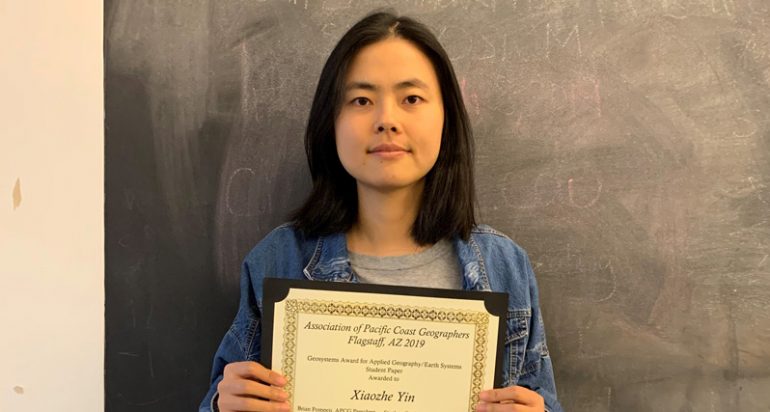Population, Health and Place student excels at first conference presentation
The Association of Pacific Coast Geographers (APCG) awarded USC Spatial Sciences Institute doctoral student Xiaozhe Yin its Geosystems Award for Applied Geography and Earth Systems at its annual conference in Flagstaff, Arizona held from October 16 to 19, 2019.
Yin, a student in SSI’s Population, Health and Place Ph.D. program, received this award recognizing the best paper presented by a doctoral student at the conference. Her paper, which is part of her dissertation research, examined the prediction of traffic noise using mobile data collection methods and machine learning techniques. She received a $500 cash prize for this award.
“I am trying to understand the contribution of traffic data, built environment, meteorological data and other GIS data to traffic noise and how environmental exposures such as noise, air pollution, light at night and green space combine to affect children’s health,” said Yin. “Building a traffic noise model is of crucial importance to help us understand more about its detrimental health effects,” she added.
Yin has premised that traditional fixed data collection method to measure traffic noise cannot capture its spatial heterogeneous characteristics. She is utilizing a method to collect mobile data that is capable of identifying small-scale spatial patterns for more polluted areas. The collected data then was compared with traffic noise from TNM2.5. The results indicate that TNM2.5 overestimate more than 15dB in north Long Beach area.
In order to understand the contributions of different geospatial and meteorological data to traffic noise, her team adopted four-machine learning models: linear regression, Extreme Gradient Boosting (XGBoost), Random Forest and Multilayer Perceptrons (MLPs) to predict the A-weighted equivalent continuous sound level LAeq. Based on model performance criteria, Random Forests outperformed other three models by having the smallest RMSE and largest R2. Among all the variables, the distance to the residential roads was found to significantly contribute to the traffic noise levels.
Yin summarized, “Our study proves the efficiency of mobile data collection method and the potential of machine learning technique to model traffic noise problems. Linear regression performed the worst, suggesting the non-linear relationship among the predicting features. Therefore, more advanced deep learning techniques should be considered in future study as more and more features are introduced.”
Participating in the APCG conference was an exciting and inspirational experience for Yin.
“This was my first conference presentation and I learned a great deal from this opportunity,” Yin said. “I learned the importance of getting input on my work from others. Only in this way can I understand where my research stands in this area and gain more knowledge from more experienced scholars. I appreciated how encouraging the other conference attendees were, which has given me a lot of confidence to continue my research,” Yin added.
She concluded, “I very much appreciate all the guidance and encouragement from my advisor, Dr. Meredith Franklin, and also from Dr. Yao-Yi Chiang. This award inspires me to dive deeper into the noise world and push forward to expand my knowledge in it.”




